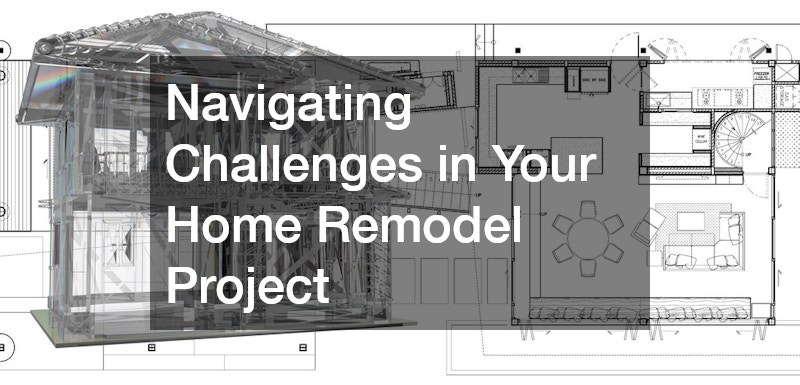Remodeling Goals
Embarking on a home remodel project can be both exhilarating and daunting. Whether you’re updating a single room or renovating an entire house, the process involves countless decisions, meticulous planning, and often a significant financial investment. A successful remodel requires not only a clear vision of what you want to achieve but also a comprehensive understanding of the steps involved. From the initial concept to the final touches, every phase of the project presents its unique challenges. By carefully navigating these challenges, you can transform your home into a space that reflects your style and meets your practical needs. This guide aims to help you understand and manage the critical aspects of your remodel project, ensuring a smoother and more enjoyable experience.

Understanding the Scope of Your Remodel
When starting a remodel project, one of the first tasks is to define the scope of work. This involves identifying which areas of your home need attention and determining the extent of the renovations. A clear understanding of the project’s scope will help set realistic expectations and provide a roadmap for the work ahead. It’s essential to consider both your current needs and plans. Are you looking to create more space, update outdated fixtures, or improve the overall aesthetics? Answering these questions will help you create a comprehensive plan that addresses all aspects of your remodel project.
For instance, if your remodel project includes updating the exterior of your home, understanding the scope might involve evaluating the condition of your roof. Hiring residential roofing services can ensure that your roof is not only aesthetically pleasing but also structurally sound and weather-resistant. Assessing the scope also means considering how different parts of your home interact. For example, a new roof might require new gutters or impact your home’s insulation. By thoroughly understanding the scope, you can plan more effectively and avoid costly surprises down the road.
Setting a Realistic Budget and Timeline
Setting a realistic budget and timeline is crucial for the success of any remodel project. Without a clear budget, costs can quickly spiral out of control, leading to financial strain and unfinished projects. Similarly, an unrealistic timeline can cause frustration and delays, impacting your daily life. Start by researching the average costs for similar projects and consider consulting with professionals to get accurate estimates. It’s also wise to include a contingency fund for unexpected expenses that often arise during a remodel. A well-planned budget will provide a financial framework that keeps your project on track.
For example, if your remodel project includes installing a new fence, it’s important to allocate funds for quality materials and skilled fence installers. Obtaining multiple quotes and understanding the pricing structure can help you set a more accurate budget. In terms of timeline, factor in the availability of your chosen contractors and any potential delays due to weather or supply issues. By setting a realistic budget and timeline, you can ensure that each phase of your remodel project proceeds smoothly, minimizing stress and maximizing satisfaction with the final results.

Choosing the Right Contractors
Selecting the right contractors for your remodel project is one of the most critical decisions you will make. Good contractors bring expertise, reliability, and quality craftsmanship to your project, ensuring that your vision is brought to life efficiently and effectively. Start by researching and gathering recommendations from friends, family, and online reviews. Check their credentials, including licenses, insurance, and previous work portfolios. Meeting with potential contractors allows you to gauge their communication skills and compatibility with your project’s goals. The right contractor will be a partner in your remodel project, offering valuable insights and solutions to any challenges that arise.
For example, if your remodel project involves installing a radiant heating system, finding a contractor with specific experience in this area is essential. A skilled professional can ensure that the system is installed correctly, providing efficient and consistent heating throughout your home. They can also advise on the best products and technologies to use, enhancing the overall performance and longevity of your new heating system. By taking the time to choose the right contractors, you set a solid foundation for the success of your remodel project, ensuring that each aspect is handled with care and expertise.
Navigating Permit and Zoning Requirements
Navigating permit and zoning requirements is an integral part of planning any remodel project. Understanding the legal and regulatory landscape ensures that your project complies with local laws, avoiding potential fines and delays. Permits are typically required for structural changes, electrical work, plumbing, and other significant alterations. The process involves submitting detailed plans and specifications to your local building department and waiting for approval. Zoning laws may also affect what changes you can make, particularly if you live in a historic district or a community with specific aesthetic guidelines. Familiarizing yourself with these requirements early on can save time and hassle as your remodel project progresses.
For instance, if your remodel project includes updating your home’s plumbing system, you will need to secure the appropriate permits before beginning any work. Hiring a reputable plumbing service can help streamline this process, as experienced plumbers are usually well-versed in local codes and can ensure that all work meets regulatory standards. They can also assist with submitting permit applications and scheduling inspections. By understanding and adhering to permit and zoning requirements, you protect the integrity of your remodel project and ensure that all work is completed legally and safely.

Creating a Detailed Project Plan
Creating a detailed project plan is essential for organizing and managing your remodel project effectively. A well-structured plan outlines each phase of the project, including timelines, milestones, and resource allocation. Start by listing all the tasks that need to be completed, from demolition to final touches, and estimate the time required for each. Include a sequence of work that logically follows the construction process to avoid delays and rework. This plan should also incorporate budget details, ensuring that financial resources are allocated appropriately to each task. A comprehensive project plan serves as a roadmap, guiding your remodel project from start to finish.
For example, if your remodel project involves garage door installation, your plan should detail the steps required, such as removing the old door, preparing the site, and installing the new system. Scheduling these tasks in the correct order prevents overlap and ensures that each step is completed efficiently. Additionally, specifying the materials and tools needed for each phase can help avoid last-minute purchases and interruptions.
Managing Unexpected Challenges and Delays
Every remodel project encounters unexpected challenges and delays, no matter how well-planned. These can range from discovering structural issues to experiencing supply chain disruptions. The key to managing these setbacks is flexibility and proactive problem-solving. When unexpected issues arise, assess the situation quickly and consider alternative solutions. Maintaining open communication with your contractors can help you adapt to changes without compromising the overall timeline or budget. Setting aside a contingency fund and extra time in your project plan can also provide a buffer for handling unforeseen challenges. Embracing these setbacks as part of the remodel journey can ultimately lead to a more resilient and well-executed project.
For instance, during your remodel project, you might encounter problems with your septic system that were not initially apparent. In such cases, it’s crucial to engage a professional septic service to diagnose and resolve the issue promptly. Addressing septic problems early can prevent more significant complications later, such as backups or environmental hazards. By incorporating potential setbacks into your project plan and maintaining a flexible approach, you can navigate these challenges effectively, ensuring that your remodel project continues to progress smoothly despite any obstacles.

Ensuring Quality Control Throughout the Process
Ensuring quality control is a critical aspect of any remodel project. Quality control involves regularly checking that all work meets the required standards and specifications. This includes monitoring the materials used, the workmanship of contractors, and adherence to the project plan. Establishing clear quality benchmarks at the beginning of your project helps guide the construction process and provides a standard for evaluating progress. Regular site visits and inspections allow you to identify and address any issues early, ensuring that corrections can be made before they become significant problems. Maintaining high standards throughout the remodel ensures a durable and aesthetically pleasing result.
For example, if your remodel project includes the installation of a new fireplace, it’s important to hire experienced fireplace services to ensure that the installation is both safe and visually appealing. Quality control measures for this part of the project might include verifying that the fireplace meets local safety codes, ensuring that the materials used are of high quality, and confirming that the installation process follows industry best practices.
Communicating Effectively With Your Team
Effective communication is vital for the success of any remodel project. Clear and consistent communication helps ensure that everyone involved, from contractors to homeowners, is on the same page and working towards the same goals. Establishing regular meetings and updates can help track progress, address concerns, and make necessary adjustments. It’s also important to document all communications, including changes to the project plan, budget updates, and approvals, to avoid misunderstandings. By fostering a collaborative environment, you can facilitate smoother workflows and more efficient problem-solving.
For instance, if your remodel project involves working with a professional spray foam insulation contractor, clear communication is essential to ensure that the insulation is installed correctly and meets your thermal performance expectations. Discussing the specifics of the insulation process, including areas of the home to be insulated and the desired R-value, can help prevent any miscommunications.
Incorporating Sustainable and Eco-Friendly Practices
Incorporating sustainable and eco-friendly practices into your remodel project is not only beneficial for the environment but can also enhance the value and efficiency of your home. Sustainable remodeling focuses on using materials and methods that reduce waste, conserve energy, and minimize environmental impact. This can include choosing recycled or renewable materials, installing energy-efficient appliances, and enhancing insulation to reduce heating and cooling costs. By prioritizing sustainability, you can create a healthier living space and contribute to a greener future.
For instance, if your remodel project involves significant clean-up or demolition, hiring a cleaning company that specializes in eco-friendly practices can ensure that waste is disposed of responsibly and recyclable materials are properly sorted. They can also use environmentally friendly cleaning products to reduce chemical exposure in your home. By incorporating these sustainable practices into your remodel project, you not only support environmental conservation but also create a more efficient and healthy home for you and your family.
Finalizing Your Remodel and Enjoying the Results
The final stages of a remodel project are critical to ensuring that every detail meets your expectations and the project is completed to your satisfaction. This phase involves thorough inspections, touch-ups, and final approvals. It’s important to walk through your home with your contractor to identify any remaining issues or unfinished tasks. Addressing these before the project is officially closed ensures that all work is completed to the highest standards. Additionally, this is the time to familiarize yourself with any new systems or features in your home and understand their maintenance requirements.
For example, if your remodel project requires extensive waste management, coordinating with a reliable dumpster rental service can facilitate the efficient removal of debris and leftover materials. Ensuring that the final clean-up is handled professionally can help you transition smoothly into enjoying your newly remodeled space. By taking the time to finalize all aspects of your remodel project thoroughly, you can fully appreciate the transformation and take pride in the successful completion of your home renovation.
Benefits Of Following a Plan
A successful home remodel project requires careful planning, diligent execution, and effective management of various challenges. By understanding the scope of your remodel, setting a realistic budget and timeline, choosing the right contractors, navigating permits and zoning requirements, and creating a detailed project plan, you can lay a solid foundation for your project. Managing unexpected challenges, ensuring quality control, and maintaining clear communication with your team further enhance the process. Incorporating sustainable practices adds value and environmental benefits, while thorough finalization ensures your satisfaction with the results.



